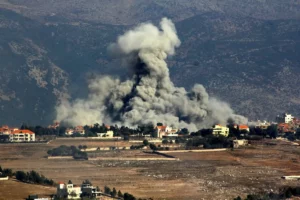Iran would welcome the normalisation of relations with Egypt, its Foreign Minister has said, in the latest indication the two regional powerhouses may be close to an agreement to exchange ambassadors after decades fraught with tension and distrust.
Hossein Amirabdollahian made the comments during a meeting with ambassadors of Islamic nations in Tehran, to mark Eid Al Adha.
Citing the recent restoration of diplomatic ties with Saudi Arabia, Mr Amirabdollahian said a key pillar of the government’s foreign policy was improving ties with the Islamic world.
“We also welcome the development of relations and the normalisation of ties with other regional and global Muslim countries, including the Arab Republic of Egypt and the brotherly country of Morocco,” he said during the meeting on Thursday.
Mr Amirabdollahian’s comments echoed those made by Iran’s supreme leader, Ayatollah Ali Khamenei, a month ago.
“We welcome this issue and have no problem in this regard,” said the Iranian leader, who has the final word on his country’s major foreign and domestic policies. He was speaking during a May 29 meeting with Oman’s Sultan Haitham.

The Sultan’s visit to Iran followed his talks earlier in May with Egyptian President Abdel Fattah El Sisi in Cairo. The talks, according to the officials, touched on the normalisation of Iran-Egypt ties.
In Cairo, Egyptian officials say preparations are under way for a meeting between the Iranian and Egyptian foreign ministers, possibily in Oman, to announce the restoration of full diplomatic relations.
They said the meeting could take place as early as next month.
Oman has long served as an interlocutor in regional conflicts and disputes, including those involving western nations. It enjoys close relations with both Iran and the US.

The Egyptian officials have also said Mr El Sisi and his Iranian counterpart, Ebrahim Raisi, are exepcted to meet later this year.
The restoration of full diplomatic ties between Egypt and Iran would be a significant step in the ongoing recalibration of the Middle East’s political landscape.
Relations between the traditional Arab centres of power with non-Arab Iran and Turkey are thawing, while Syria, whose government had been a pariah for more than a decade, was recently readmitted to the Arab fold.
Mid-level diplomats and intelligence officials from Iran and Egypt met behind closed doors in Baghdad in March and April to discuss the normalisation of relations, according to Egyptian and Iraqi officials. More senior officials from the two nations met again in June.
Relations between Egypt and Iran began to sour in the aftermath of the 1979 Islamic revolution when the late Egyptian leader Anwar Sadat welcomed the deposed Shah Mohammad Reza Pahlavi to Egypt and a year later, allowed his burial in Cairo – after he succumbed to cancer.
There was a relative thaw after longtime Egyptian leader Hosni Mubarak stepped down amid a popular uprising in 2011 and the subsequent election of Mohammed Morsi, an Islamist, a year later.
Mr Morsi was removed from power in 2013 and ties with Tehran cooled after Mr El Sisi took office in 2014.
More recently, relations have been tense over what Cairo sees as Iran’s meddling in the internal affairs of Arab nations such as Iraq, Syria, Lebanon and Yemen.
In a thinly veiled reference to Iran, Mr El Sisi has repeatedly declared Egypt’s willingness to come to the aid of its Gulf Arab allies and benefactors if they faced an external threat.
Egyptian officials believe normalised relations with Iran would secure Tehran’s goodwill in relation to Cairo’s efforts to forge closer economic and commercial ties with countries such as Iraq, Syria and Lebanon, where Iran wields significant influence.
Cairo will also seek to persuade Tehran to drop its support for Hamas and Palestinian Islamic Jihad, the two main militant groups in the Gaza Strip, which borders Egypt, according to officials.
Outbreaks of hostilities between the two militant groups and Israel present a security threat to Egypt and impede its efforts to reconcile them with the Palestinian Authority in the occupied West Bank.
Source : thenationalnews

















Add Comment